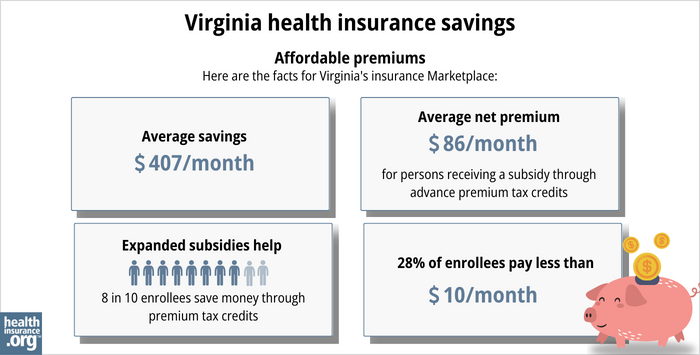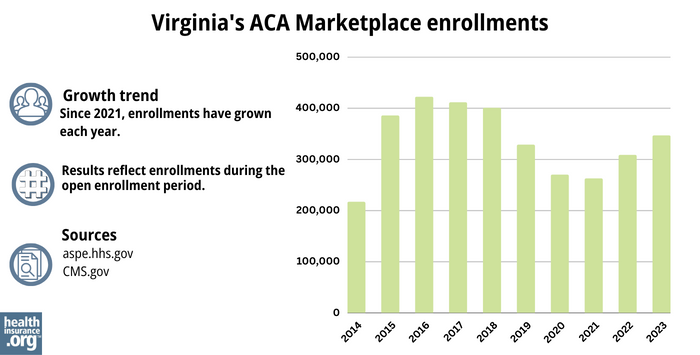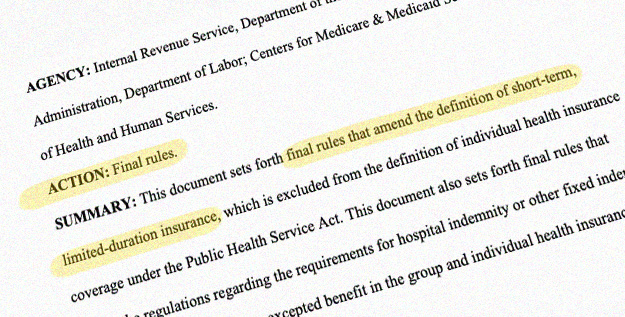Home > States > Health insurance in Virginia
See your Virginia health insurance coverage options.

Find individual and family plans, small-group, short-term or Medicare plans through licensed agency partners.

Virginia Health Insurance Consumer Guide
This guide, including the FAQs below, was developed to help you choose the right health insurance plan for you and your family. The coverage options found in Virginia’s ACA Marketplace may be a good choice for many consumers, and we’re here to help explain the choices available. Scroll down to see frequently asked questions about health insurance in Virginia.
Prior to 2024, Virginia residents enrolled in individual/family health coverage through HealthCare.gov. But the state debuted a new state-run Marketplace plaftorm, called Virginia’s Insurance Marketplace, in the fall of 2023. This platform is where residents shop for coverage effective in 2024 and future years.1
Virginia’s Insurance Marketplace offers plans from 11 insurers for 2024, down from 12 in 2023.2
The federal government helps consumers pay for insurance through an advance premium tax credit if they buy coverage from the exchange. Depending on your income and other circumstances, you may also get help to lower your monthly insurance premium (the amount you pay to enroll in the coverage) and possibly your out-of-pocket expenses.
Reinsurance, easy enrollment, benchmark plan changes
In addition to developing its own state-run exchange platform that debuted in the fall of 2023, Virginia also has a reinsurance program that took effect in 2023 and helped to reduce premiums for people who don’t get subsidies. Ongoing funding for this program was instrumental in preventing large rate increases for 2024.
Virginia also implemented an easy enrollment program in 2021, which helps to get people enrolled in health insurance as part of the tax filing process. By the spring of 2024 this program will include a special enrollment period to allow people to sign up for health coverage.
Virginia has received federal approval to update its benchmark plan starting in 2025. The benchmark plan is used to determine specific benefits that must be covered by individual and small-group health plans. The updates include additional coverage for certain prosthetic devices, and coverage of formula and enteral nutrition products for inherited metabolic disorders.3
Explore our other comprehensive guides to coverage in Virginia
Dental coverage in Virginia

Looking to improve your smile? Dental insurance may be a smart addition to your health coverage. Our guide explores dental coverage options in Virginia.

Virginia’s Medicaid program

Medicaid expansion in Virginia took effect in January 2019. Since then, Virginia’s Medicaid enrollment has grown to more than 3 million people.4

Medicare coverage and enrollment in Virginia

As of May 2023, the number of Medicare beneficiaries in Virginia was 1,631,641.5 Our Virginia Medicare guide explains what you need to know about Medicare’s coverage options, as well as Virginia’s Medigap (Medicare Supplement) regulations.

Short-term coverage in Virginia

In Virginia, short-term health insurance plans are available for purchase but state regulations ban the sale of the plans during the ACA open enrollment window.6

Frequently asked questions about health insurance in Virginia
Who can buy Marketplace health insurance?
To qualify for health coverage through the Virginia Marketplace, you must: 7
- Live in Virginia
- Be lawfully present in the United States
- Not be incarcerated
- Not be enrolled in Medicare
Eligibility for financial assistance (premium subsidies and cost-sharing reductions) depends on your income and how it compares with the cost of the second-lowest-cost Silver plan in your area – which depends on your age and location. In addition, to qualify for financial assistance with your Marketplace plan you must:
- Not have access to affordable health coverage through your employer. If your employer offers coverage but you feel it’s too expensive, you can use our Employer Health Plan Affordability Calculator to see if you might qualify for premium subsidies in the Marketplace.
- Not be eligible for Medicaid or CHIP.
- Not be eligible for premium-free Medicare Part A.8
When can I enroll in an ACA-compliant plan in Virginia?
The open enrollment period for individual/family health coverage runs from November 1 to January 15 in Virginia.9
If you need your coverage to start on January 1, you must apply by December 15. If you apply between December 16 and January 15, your coverage will begin on February 1.7
The same deadlines will continue to be used by Virginia’s Insurance Marketplace after the state transitions away from HealthCare.gov in the fall of 2023.
Outside of open enrollment, a qualifying event is necessary to enroll or make changes to your coverage. Note that once Virginia’s Insurance Marketplace is in use, Virginia will be able to offer a special enrollment period in conjunction with the state’s tax-season “easy enrollment” program.
If you have questions about open enrollment, you can learn more in our comprehensive guide to open enrollment. We also have a comprehensive guide to special enrollment periods.
How do I enroll in a Marketplace plan in Virginia?
To enroll in an ACA Marketplace plan in Virginia, you can:
- Visit HealthCare.gov to access Virginia’s health insurance marketplace. Here you will find an online platform to shop, compare, and choose the best health plans. Starting in November 2023, for coverage effective in 2024, you’ll use Virginia’s Insurance Marketplace instead of HealthCare.gov.
- Purchase individual and family health coverage with the help of an insurance agent or broker, a Navigator or certified application counselor, or an approved enhanced direct enrollment entity (EDE).10 (Note that as of November 2024, there will no longer be EDEs in Virginia, which means all Marketplace enrollments will have to be completed directly through the Virginia Insurance Marketplace. But brokers, Navigators, and enrollment assisters will continue to be available.)
For enrollment in 2023 coverage, you can also call HealthCare.gov’s contact center by dialing 1-800-318-2596 (TTY: 1-855-889-4325). The call center is available 24 hours a day, seven days a week, but it’s closed on holidays.
How can I find affordable health insurance in Virginia?
You may find affordable health insurance options in Virginia by signing up through HealthCare.gov. Starting in the fall of 2023, you’ll use Virginia’s Insurance Marketplace instead.
As of early 2023, nearly nine out of ten eligible enrollees in Virginia saved money on premium payments that amounted to an average savings of $407/month – reducing the average net premium of subsidy-eligible enrollees to $86/month after subsidies.11
The Affordable Care Act provides income-based advance premium tax credits (subsidies) that offset your premium payments to help keep your expenses down. People with household incomes below 250% of the federal poverty level also qualify for cost-sharing reductions (CSR) that may reduce your deductibles and out-of-pocket expenses when you buy a Silver plan. Between the premium subsidies and cost-sharing reductions, you may find that an ACA plan is the cheapest health insurance option for you.

Source: CMS.gov11
How many insurers offer Marketplace coverage in Virginia?
There are 13 insurers that offer health plans in Virginia’s exchange for 2024, including two separate Aetna entities.2
One carrier that offered plans in 2023, Piedmont Community Healthcare, opted to withdraw from the individual/family market in Virginia at the end of 2023, so their plans are not available for 2024.12
Are Marketplace health insurance premiums increasing in Virginia?
The insurers that offer individual market coverage through Virginia’s exchange initially proposed rate changes for 2024 that amounted to an average increase of about 28%.13 But that was before the legislature had approved continued funding for the state’s reinsurance program. The insurers proposed revised rates once the reinsurance funding was allocated. The revised rates, which were approved, amount to a weighted average increase of only about 1%.14
According to SERFF and the Virginia Bureau of Insurance, Virginia’s insurers will implement the following average rate changes for 2024:15 (Note that these rates are calculated before subsidies are applied; most enrollees qualify for subsidies and thus do not pay full price for their coverage.)
Virginia’s ACA Marketplace Plan 2024 Approved Rate Increases by Insurance Company |
|
|---|---|
| Issuer | Percent Increase |
| Aetna Health (HMO) | 3.7% |
| Aetna Life (EPO) | 6.6% |
| CareFirst | 8.4% |
| Cigna | 5.7% |
| Group Hospitalization and Medical Services Inc. | 5.1% |
| HealthKeepers (Anthem) | -4.6% |
| Innovation Health Plan | 6.7% |
| Kaiser Foundation Health Plan of the Mid-Atlantic | 4.8% |
| Optimum Choice | 7.8% |
| Oscar Health | -0.5% |
| Piedmont Community HealthCare (and Piedmont HMO) | exiting the market |
| Sentara Health Plan (formerly Optima) | -3.1% |
Source: Virginia SERFF Filings15
For perspective, here’s a summary of how overall average pre-subsidy premiums have changed in Virginia’s Marketplace over the years:
How many people are insured through Virginia’s Marketplace?
During the open enrollment period for 2023 coverage, 346,140 Virginia residents enrolled in private qualified health plans (QHPs) through the Virginia ACA marketplace.24
This was the highest enrollment the state had seen since 2018, and likely was connected to the American Rescue Plan (ARP). Under the ARP, subsidies are more significant and accessible. And this has been extended through the end of 2025 by the Inflation Reduction Act. 25

Source: 2014,26 2015,27 2016,28 2017,29 2018,30 2019,31 2020,32 2021,33 2022,34 202325
What health insurance resources are available to Virginia residents?
HealthCare.gov 800-318-2596 (for enrollments with a 2023 effective date)
Virginia’s Insurance Marketplace
The state-run exchange began to be used starting in November 2023, and is used for all plans with effective dates of 2024 or later.
Virginia Health Care Foundation
Virginia Consumer Assistance Program
Assists people insured by private health plans, Medicaid, or other plans in resolving problems pertaining to their health coverage; assists uninsured residents with access to care.
(877) 310-6560 / [email protected]
State Exchange Profile: Virginia
The Henry J. Kaiser Family Foundation overview of Virginia’s progress toward creating a state health insurance exchange.
Louise Norris is an individual health insurance broker who has been writing about health insurance and health reform since 2006. She has written dozens of opinions and educational pieces about the Affordable Care Act for healthinsurance.org.
Footnotes
- “Health Benefit Exchange” SCC.Virginia.gov ⤶
- 2024 ACA Individual Market Rate Summary. Virginia State Corporation Commission, Bureau of Insurance. October 2023. ⤶ ⤶
- “Virginia Essential Health Benefits Benchmark Plan Receives Federal Approval“ SCC.Virginia.gov. September 21, 2023. ⤶
- “Enrollment Reports” Department of Medical Assistance Services, Commonwealth of Virginia Accessed September 2023 ⤶
- “Medicare Monthly Enrollment ” CMS.gov, May 2023. ⤶
- “Availability of short-term health insurance in Virginia” healthinsurance.org, Jan. 12, 2023 ⤶
- “A quick guide to the Health Insurance Marketplace“HealthCare.gov ⤶ ⤶
- Medicare and the Marketplace, Master FAQ. Centers for Medicare and Medicaid Services. Accessed November 2023. ⤶
- “When can you get health insurance?” HealthCare.gov, 2023 ⤶
- “Entities Approved to Use Enhanced Direct Enrollment” CMS.gov, April 28, 2023 ⤶
- “2023 Marketplace Open Enrollment Period Public Use Files”CMS.gov, 2023 ⤶ ⤶
- Piedmont Not Participating in 2024 Individual/Family On- or Off-Exchange Plans. Piedmont Community Healthcare. October 2023. ⤶
- “ACA Rate & Form Filing Information – 2024 Presentations”, State Corporation Commission, Virginia.gov, Accessed August 2023 ⤶
- ”Virginia: *Final* Avg. Unsubsidized 2024 #ACA Rate Changes Plummet From +22.4% To +1.1% Via Reinsurance Renewal” ACA Signups. September 2023. ⤶
- “Virginia SERFF Filing Access” Virginia SERFF. Accessed September 2023, and 2024 ACA Individual Market Rate Summary. Virginia State Corporation Commission, Bureau of Insurance. October 2023. ⤶ ⤶
- “Virginia: *Approved* 2016 Avg. Rate Hikes: 8.5% Individual, 2.9% Small Group” ACA Signups. October 2015 ⤶
- “Avg. UNSUBSIDIZED Indy Mkt Rate Hikes: 25% (49 States + DC)” ACA Signups. October 2016 ⤶
- “Virginia: APPROVED Unsubsidized Indy Mkt Rate Hikes: 57.7%, Big Chunk Due To CSR Sabotage” ACA Signups. September 2017 ⤶
- “Virginia: APPROVED (?) 2019 #ACA Rate Hikes Drop *Another* 1.7 Points; Still Would’ve Been Much Lower W/Out #ACASabotage” ACA Signups. August 2018. ⤶
- “2020 Rate Changes” ACA Signups. October 2019 ⤶
- “2021 ACA Rate Filing Data” Virginia State Corporation Commission. August 2020. ⤶
- “Virginia: Approved Avg. 2022 #ACA Rate Changes: -2.9% Indy Market; +3.6% Sm. Group; 3 New Carriers Join Market” ACA Signups. October 2021 ⤶
- “Virginia: Final Avg. Unsubsidized 2023 #ACA Rate Changes: -12.9% Thanks To New Reinsurance Waiver (Updated)” ACA Signups. September 2022 ⤶
- “Marketplace 2023 Open Enrollment Period Report: Final National Snapshot” CMS.gov, Jan. 25, 2023 ⤶
- “Health Insurance Marketplaces 2023 Open Enrollment Report” CMS.gov, Accessed August 2023 ⤶ ⤶
- “ASPE Issue Brief (2014)” ASPE, 2015 ⤶
- “Health Insurance Marketplaces 2015 Open Enrollment Period: March Enrollment Report”, HHS.gov, 2015 ⤶
- “HEALTH INSURANCE MARKETPLACES 2016 OPEN ENROLLMENT PERIOD: FINAL ENROLLMENT REPORT” HHS.gov, 2016 ⤶
- “2017 Marketplace Open Enrollment Period Public Use Files” CMS.gov, 2017 ⤶
- “2018 Marketplace Open Enrollment Period Public Use Files” CMS.gov, 2018 ⤶
- “2019 Marketplace Open Enrollment Period Public Use Files” CMS.gov, 2019 ⤶
- “2020 Marketplace Open Enrollment Period Public Use Files” CMS.gov, 2020 ⤶
- “2021 Marketplace Open Enrollment Period Public Use Files” CMS.gov, 2021 ⤶
- “2022 Marketplace Open Enrollment Period Public Use Files” CMS.gov, 2022 ⤶







